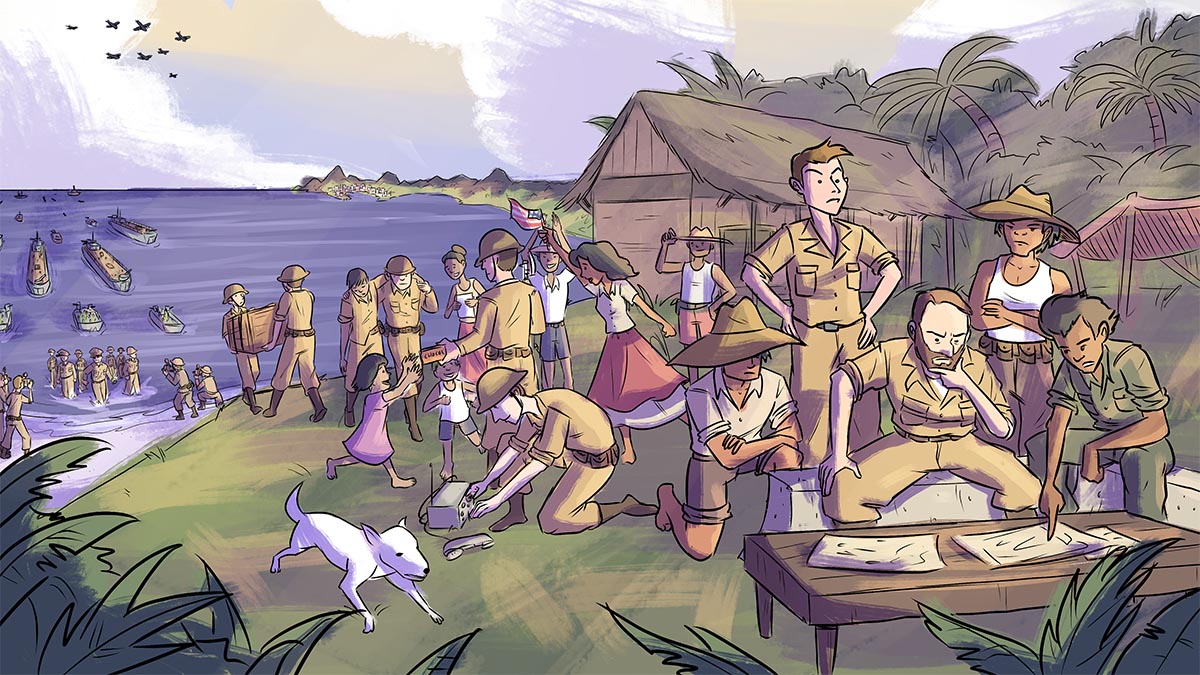(www.FilVetRep.org)
For Immediate Release
February 19, 2022
Contact: Jon Melegrito
Tel. 202-361-0296
Email: jdmelegrito@gmail.com
With the completion of a full online interactive educational program, educators are now able to access, free of charge, resources that bring to life the story of U.S. colonization and war from the perspective of Filipinos who fought under the American flag and who continued to fight for nearly 70 years after they were denied recognition and stripped of the benefits promised them by America.
Called “Duty to Country,” FilVetREP’s education program, www.dutytocountry.org, was first launched in November 2021. It features an online exhibition, “Under One Flag,” which explores the untold story of the United States and the Philippines, along with first-hand accounts of living veterans and their families, historians, and community advocates. Hundreds of archival photographs, artifacts, films, and historical documents are showcased in this exhibit.
Last month, FilVetREP rolled out the second phase of its interactive education project.
Designed for teachers in the classroom, the curriculum includes five lesson plans on key historical moments: the colonial period, World War II, the establishment of an independent Philippines and the passage of the Rescission Act, and the civil rights movement to restore veterans’ benefits and path to U.S. citizenship. It also features ten explainers built around primary sources, maps and infographics that help students make sense of this long history. There is also a resource guide, “Teaching with Duty to Country,” that highlights a dynamic mix of interviews, primary sources, animations and illustrations, videos, and profile cards.
Click here to view the For Educators portion of the website: https://dutytocountry.org/for-educators
These free online resources are easy to use and are all integrated into the “Duty to Country” exhibition, www.dutytocountry.org.
Award-winning web design
“Duty to Country” is developed by Night Kitchen Interactive, an award-winning web-based development company in Philadelphia. It has won several awards in the last two years:

Working with Night Kitchen Interactive is a professional team of educators and academic experts. They include Prof. Chris Capozzola, author and Professor of History at Massachusetts Institute of Technology, Dr. Seth Watkins, a prominent lawyer and professor at Duke University; Dr. Colleen Woods, Associate Professor of History at the University of Maryland, College Park; and Leah Nahmias, curriculum developer currently serving as Community Leadership Officer at Central Indiana Community Foundation.
The education project is fully funded by FilVetREP, with support from corporate sponsors, community organizations and individual donors.
Bringing history to life
“Students and teachers need to hear the voices and see the faces of American and Filipino soldiers who fought under the American flag and make their stories come to life in America’s classrooms,” said FilVetREP National Chairman Maj. Gen. Antonio Taguba (Ret). “That’s our main goal in this education project: to ensure that the historic legacy of Filipino and American World War ll veterans will be preserved for posterity.”
Having accomplished its first mission in October 2017 of securing recognition for the more than 260,000 Filipino soldiers who served, FilVetREP undertook its second mission soon after Congress honored them with the Congressional Gold Medal.
“It’s not enough that we secured their recognition after they waited for more than 70 years,” Taguba noted. “The Congressional Gold Medal honoring their service and sacrifice was a great start. But we wanted more for them. By creating an educational venue, we will enshrine their story in American history, and continue telling their story for generations to come.”

Educational Platform
With an educational program now accessible for free, teachers and educators will have various resources to engage students in the story of Filipino and American veterans. Although it is designed primarily for students from K to twelve, the curriculum is also adaptable for university classrooms. In the lesson plans and explainers, the story of Filipino veterans intersects with major themes in U.S. history including immigration, civil rights and social movements, politics, and US foreign policy.
“From the beginning, we knew we wanted a wide range of teachers and students to be able to engage with this history in a multifaceted way– through animated videos, oral histories, photographs, and documents,” said Woods. “This diversity of sources will provide historical context and prompts for reflection. Our educational materials cover over 100 years of history, but we’ve designed our site so that teachers do not have to teach the entire 100 years. Instead, they can choose different entry points —allowing them to adopt lesson plans to fit different parts of the curriculum. For example, our lesson plan, titled You Decide: Filipino Veterans Long Fight for Justice, could be taught alongside other social movements of the long civil rights era.”
Capozzola adds that the rich content of the curriculum tackles some of the biggest questions in world and U.S. history – war, empire, colonization, military service, racism, immigration, civil rights, and fight for racial justice. “The graphic narratives give history a human face,” he points out. “And they are designed for students at all grade levels, different languages, backgrounds, reading abilities, and learning styles. Everyone can find a path into this history in a really productive way, allowing you to think and reflect and holding us accountable as teachers and as learners about the history we learn.” Capozzola recently published “Bound for War,” a book which tells the epic story of America’s long and fateful military relationship with the Philippines amid a century of Pacific warfare.
Rich Inheritance
“For all students of all ages, you have been bequeathed with a rich inheritance,” says Capozzola. “This culturally responsive curriculum complements what’s already being taught on the civil rights movement and connects students to topics often overlooked in social studies, which are written from an American perspective.”
To that end, he encourages educators, students, parents, and community members “to reach out to school boards in their districts. Everybody can chime in. No need to be an educational ‘expert’ to have a voice!”
Nahmias also identified other points of entry for the program: social studies specialists in charge of curriculum, state level teachers’ associations, and superintendents or principals in smaller communities. She notes that states are passing new Asian American Studies requirements. “There are not many materials out there, so folks are really hungry for resources to teach Asian American history,” she says. “This is high quality curriculum developed by historians and scholars. Professional associations, state history museums and historical societies are all eager to discover these kinds of resources.”
In their own voice
At the January 27, 2022 launching of Part Two of FilVetREP’s education project, Taguba explained the critical importance of various resources so that educators and learners can engage students in the dynamic story of Filipino and American veterans. “Because their story was largely written by American military historians, they conveniently left out the contributions of these brave men and women,” Taguba said. “This is tantamount to being non-existent because when the story of Filipino World War II veterans is not told in their own voices, their service will never be known. Moreover, the American people will never understand why the U.S. not only broke its promise to these soldiers but also refused to recognize them for more than 70 years, robbing them of their honor and dignity. It’s a story that can never be told unless we enshrine it in American history.”
Next steps for FilVetREP are to actively promote the program by reaching out to several national organizations, school districts, Asian American Studies groups and advocates. “This is still a work in progress and we hope to further improve the program,” Taguba said. “For now, our main objective is to make it accessible and utilized and bring this story to life in classrooms across the country.”
Click here to view the full Jan. 27, 2022 launch event: https://youtu.be/ArWuSWUrjnU
###
The Filipino Veterans Recognition and Education Project (FilVetREP), is a nonpartisan, 501(c)(3) tax-exempt, community-based, all-volunteer national initiative whose mission is to obtain national recognition of Filipino and American WW11 soldiers across the United States and the Philippines for their wartime service to the U.S. and the Philippines from July 26, 1941 to December 31, 1946. For more information about Filipino WWII veterans and how to get involved, visit our website at www.filvetrep.org or find us on Facebook or Twitter.

